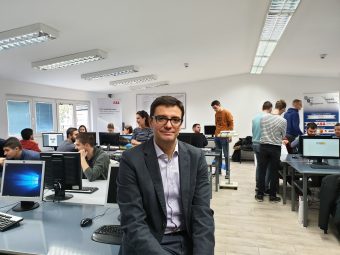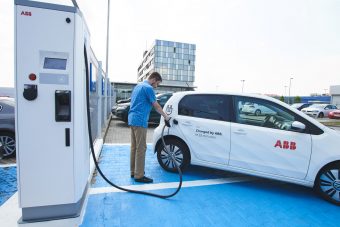
At the end of the 1980s, two prominent engineering companies Brown Boveri and Asea decided to join forces and resources. This capital enterprise was named ABB, and the newly formed company has added exactly three decades to 100 years long history of its founders, diligently writing the future of industrial digitalization. ABB is an inventive technological leader in the field of electric power networks, electrical equipment, industrial automation, robotics and motion, serving customers in utilities, industry and transport and infrastructure globally. The company emphasises two clear goals: bringing electricity from any power plant to any plug and automation of industry from natural resources to finished products. ABB now operates in more than 100 countries with about 147,000 employees.
Milan Jevremovic, Industry Segment Manager at ABB Serbia, gave us the answers to the questions about the energy efficiency solutions, the expansion of ABB’s network of electric chargers and ABB solar systems and solutions.
EP: ABB has been present for 28 years in Serbia. Which are ABB’s leading products in Serbia and what solutions have been proven to be most efficient when it comes to energy saving?
Milan Jevremovic: ABB operates in 3 sectors in Serbia: Energy, Industry, and Infrastructure and Transport. For All each of these sectors, ABB can offer a wide portfolio of products. Switchgears, medium and high voltage devices, relay protection and transformers have the most significant market share in the field of Energy. When it comes to the Industry sector, ABB is best known for its electric motors in Serbia. In addition to electric motors, we are the leaders in the domestic market in the field of frequency regulators with more than 200 MW of installed devices. It is estimated that they achieve daily savings in energy consumption of around 15 per cent of installed engine power. As far as the processing industry is concerned, there is also a complete portfolio of measurement and analytic devices as well as distributed control systems. In the last two years, robotics and advanced automation systems that support the development of Industry 4.0 are particularly prominent. In the Infrastructure and Transport sector, our company is mostly present with low-voltage equipment and All photographs: ABB distribution facilities, but also with a complete offer electrical installations in modern residential, office and commercial facilities.
EP: What are the solutions which ABB can offer for improving energy efficiency in different types of industrial plants?
Milan Jevremovic: In addition to the already mentiond products which directly or indirectly influence the reduction in energy consumption, ABB has comprehensive solution and services for improving energy efficiency for almost every type of industry. As the best example, I would like to mention a project for monitoring and managing the quality of coal that is being dug in the Kolubara Mining Basin in to improve the efficiency of boiler operation in the thermal power plants ‘Nikola Tesla’. Several excavators dig coal at the same time at different locations on the open-pit mine ‘Tamnava’. Coal is of varying quality, and the goal is to send homogenised coal of the necessary calorific value to the power plant in Obrenovac. The software tracks geological information on the locations where excavators work compares them with online data provided by analysers on excavators and conveyor belts and harmonises the final quality of coal which is delivered. If necessary, the software also allows the takeover of the coal from the warehouse to achieve the required quality of coal which is loaded into the wagons and delivered to the power plant. The combustion in the boiler is much better, the efficiency is higher, and the emission of harmful gases is lower when using the coal which has a constant quality. This is a unique project of this type in the world in which experts from PE Elektroprivreda Srbije, the Faculty of Mining and Geology, and the engineering team of ABB for open-pits from Germany worked together to come up with the best and most optimal solution. The implementation of this project is currently underway.

EP: ABB currently has the fastest charger for electric vehicles. How many chargers of that type have been installed so far and where?
Milan Jevremovic: ABB in its offer has Terra fast chargers, but the word fastest is not appropriate here. The charging speed depends not only on the power of the charger but also on the system of an electric vehicle that controls the charging. The power of ABB fast chargers goes from 50 kW, which is in practice currently shown as a minimum, up to 60kW chargers for charging the buses and tracks. When it comes to the prevalence of our chargers, it is enough to say that we have more than 6,000 electric chargers and systems installed in more than 100 countries in the world.
EP: What are the other advantages of ABB chargers apart from the fact that your chargers are technological state of the art?
Milan Jevremovic The basic model Terra 54 is a universal fast charger for all types of electric vehicles that exist today. Key parts of the charger are also ABB products that contribute to the reliability of the product itself. The small weight of the basic model, which is about 350 kg, is the result of excellent modular construction and technology. Terra 54 has five power modules that allow charging even in a case of failure of one of the modules. ABB can remotely monitor the operating parameters of each ABB’s fast charger in the world which has been put into operation and provide service and technical support to all their customers. The Terra fast charger stands out from the others since we have developed a unique design for people with disabilities, which is one of the conditions for placing on the market of the United States of America.
EP: What type of training do you organise for servicers?
Milan Jevremovic: ABB has its customer service, and it also provides training for partners who want to service ABB chargers. The training includes the training for hardware and software parts of the chargers, and after completing the training, the certified service provider can independently perform the inspection of the charger, to put it into operation and to perform service and maintenance during the exploitation.
EP: How many ABB’s chargers have been installed in Serbia and what is the prognosis for the further development of the network in Serbia?
Milan Jevremovic: So far, several slow chargers and one fast charger with remote monitoring system have been installed in Serbia. The fast charger is at the location of the company Porsche SCG in Belgrade. The development of a network of chargers in Serbia will depend on the needs and possibilities, the incentive measures, as well as the traffic development strategy that envisages the reduction of the impact of exhaust gases. Projects in this area are complex and require proper technological and economic assessments. Initial investments are not small and include support for state-owned or private-owned charging networks, various types of subsidies and incentives for the purchase of electric vehicles. The most important ones are the savings that the entire system brings and the reduction of emissions greenhouse gases. Given the fact that Serbia connects the East and the West, it is necessary to develop its network of electric chargers, so that everyone who drives electric cars, buses and hopefully trucks, can quickly and easily charge their vehicles.
EP: When are electric cars expected to become a common sight on Serbian roads, as in the countries of the European Union?
Milan Jevremovic: This is connected with the development of the infrastructure network of electric chargers as well as the aforementioned subsidies and incentives for the purchase of electric cars. It would be amazing if electric vehicles would become an everyday sight on our streets, but this will only happen once we get full support and benefits from the state. In 2012, Estonia developed a national network, precisely with ABB fast chargers, and it gave an excellent example to other countries. One fast charger of 50kW DC/22kW AC was installed at a distance of about 50 km on each main and highway in Estonia. In addition to those, additional 500 slow AC chargers were installed in governmental institutions. To inspire and motivate the others, ABB Serbia purchased an electric car last year for its own needs and installed an electric charger in front of the offices in Belgrade. By our example, we wanted to demonstrate the necessity of spreading both corporative and individual awareness on the protection of the environment.
For more information about ABB’s electric vehicle charging infrastructure click here.
Prepered by: Nevena Djukic
Read the whole interview in the new issue of the Energy portal Magazine on CLEAN ENERGY, December 2018. – February 2019.



